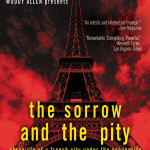
It takes a special event to pull Sandy and myself away from the television when the British Open takes over our weekend. Yet, it happened this year. Right in the middle of the Open on Sunday, we spent over four hours watching a 1971 Oscar® nominated documentary film.
I’m deep into my research for the next book, Where Did They Put the Gestapo Headquarters? A Walking Tour of Nazi Occupied Paris (1940–1944). Right now I’m focusing on the French Resistance, its members, and the foreign agents that supported the resistance movement. As part of the research, I’m “meeting” many brave men and women who were real Résistants—not the ones who put the armband on when it became clear the Allies were close to liberating the country (and Paris) in the summer of 1944. These incredible people were the resistance fighters who knew what the ultimate penalty would be for being captured by the Nazis and turned over to the Gestapo. Read More Sorrow and Pity


